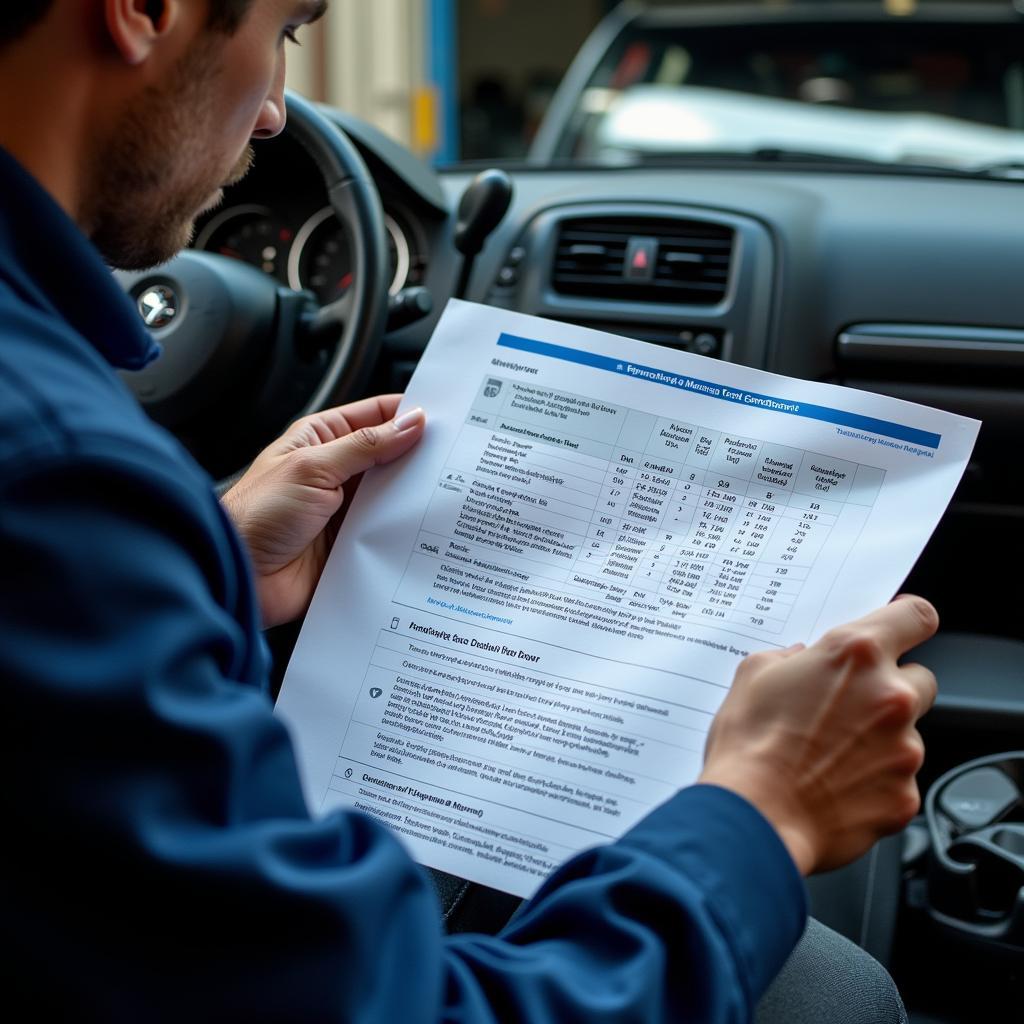Understanding what’s happening under the hood of your car can feel like navigating a foreign language. When your check engine light flashes, it often feels more like a source of anxiety than helpful information. Car diagnostic tests help translate those blinking lights into actionable insights, but what happens after the mechanic hands you a jumbled report? “Can I request car diagnostic results?” you might wonder. The answer is a resounding yes, and understanding those results is key to informed car maintenance.
Demystifying Car Diagnostic Results
 Car Diagnostic Report
Car Diagnostic Report
Car diagnostic tests are a vital part of modern car maintenance. These tests utilize specialized scanners that plug into your vehicle’s onboard computer, the heart of your car’s electronic systems. This computer continuously monitors various components and functions, storing data about their performance. A diagnostic test accesses this data, revealing potential issues through a series of standardized codes.
While these codes might seem like gibberish to the untrained eye, they hold valuable information. Mechanics use these codes, often alongside their knowledge and experience, to pinpoint the root cause of a problem. This targeted approach can save you time and money by avoiding unnecessary repairs.
Why You Should Request Your Car Diagnostic Results
Requesting and understanding your car diagnostic results is empowering. It provides you with:
- Transparency: Knowing the ‘why’ behind recommended repairs allows you to make informed decisions about your vehicle.
- Second Opinions: Armed with your diagnostic report, you can confidently seek a second opinion from another mechanic.
- Future Reference: Keeping a record of your car’s diagnostic history can be invaluable for tracking recurring issues or for resale purposes.
How to Obtain Your Car Diagnostic Results
Don’t be afraid to be proactive! Here’s how to get those results:
- Ask Upfront: Before the mechanic starts the test, request a copy of the results.
- Clarify the Format: Results can be printed or digital. Choose what’s most convenient for you.
- Request an Explanation: If the codes seem like a foreign language, ask your mechanic to walk you through the findings.
Understanding Your Car Diagnostic Report
 Mechanic Explaining Diagnostic Report
Mechanic Explaining Diagnostic Report
A typical car diagnostic report will include:
- Vehicle Identification Number (VIN): This confirms the report pertains to your specific vehicle.
- Date and Time: This indicates when the test was performed.
- Diagnostic Trouble Codes (DTCs): These are the standardized codes that pinpoint specific areas of concern.
- Code Descriptions: A brief explanation of what each DTC generally indicates.
- Additional Notes: Your mechanic may include observations or recommendations based on their expertise.
What if I Still Don’t Understand the Results?
Don’t worry, you’re not alone! Decoding car diagnostics can be tricky. Here are some resources:
- Online DTC Look-up Tools: Several websites and apps allow you to input the codes for a more user-friendly explanation.
- Automotive Forums: Connect with other car enthusiasts and mechanics online who can offer insights.
- DiagFixPro: Our website provides a wealth of information about car diagnostics, common issues, and repair advice.
Conclusion
Being an informed car owner means understanding the language your car speaks. Requesting and understanding your car diagnostic results empowers you to make the best decisions for your vehicle’s health and your wallet. By taking an active role in your car’s maintenance, you can ensure a smoother, worry-free driving experience.
FAQs
1. Are mechanics legally required to provide car diagnostic results?
While not universally mandated, ethical and reputable mechanics will readily provide these results upon request.
2. Can I use the diagnostic results to fix the car myself?
While possible for minor issues, car repairs often require specialized tools and expertise. Consult a professional for complex problems.
3. How often should I get my car’s diagnostics checked?
It’s generally recommended to have a diagnostic scan annually or if your check engine light illuminates.
4. Can car diagnostic tests detect every potential problem?
While comprehensive, these tests might not identify every issue, especially those related to wear and tear.
5. Do different car makes have different diagnostic codes?
While there are standardized codes, some manufacturers may utilize additional proprietary codes.
For any further assistance or inquiries, please don’t hesitate to reach out to us via WhatsApp at +1(641)206-8880 or email us at [email protected]. Our dedicated customer support team is available 24/7 to assist you. You can also explore our website for more informative articles on car diagnostics and repair.

Leave a Reply